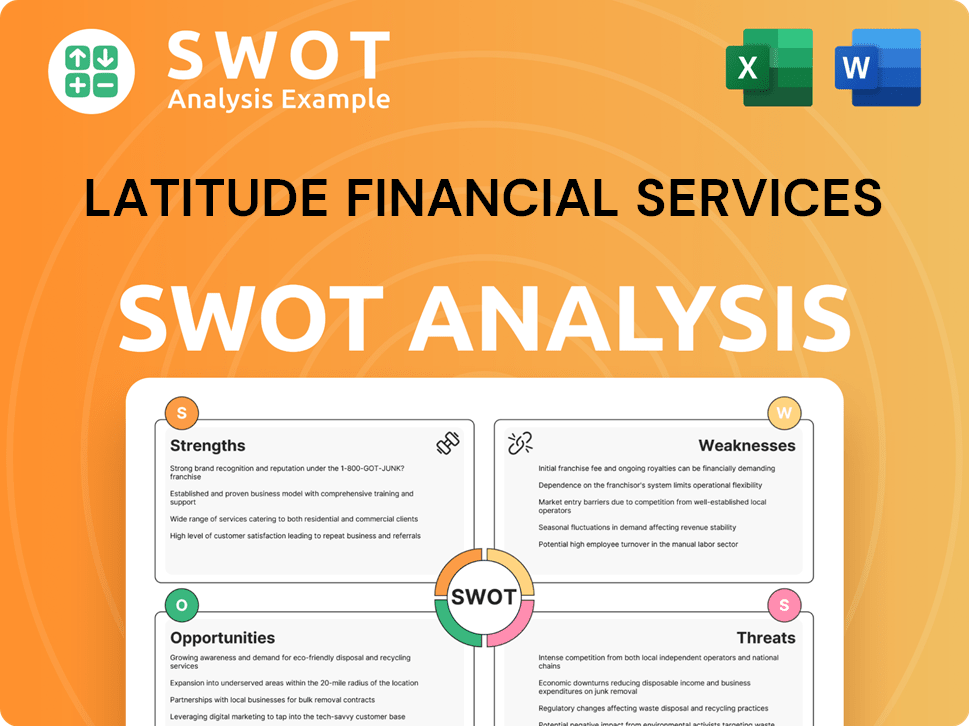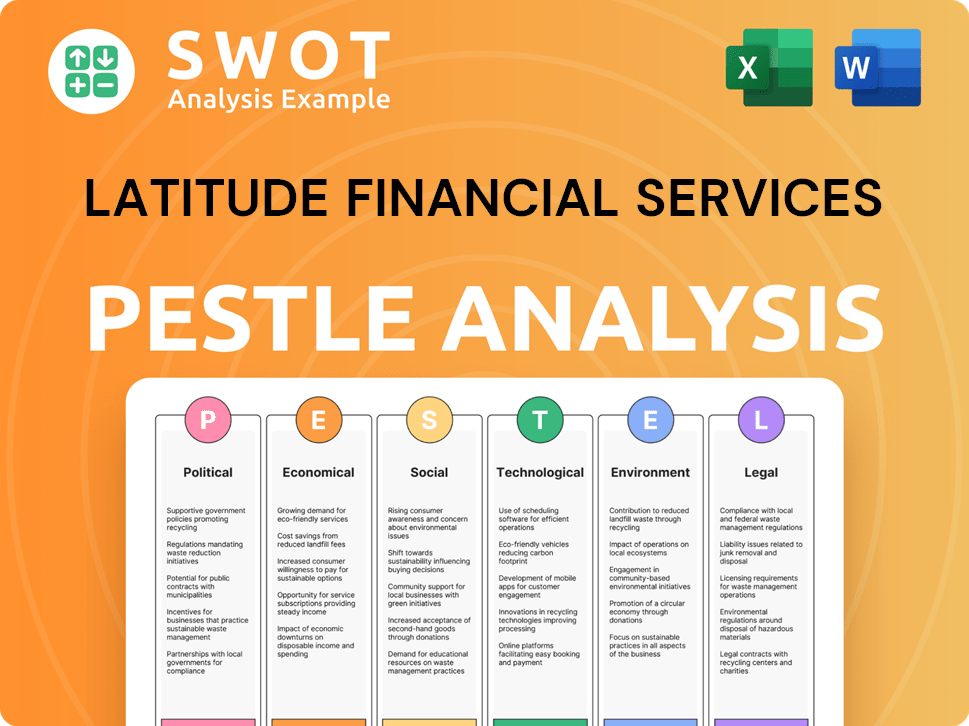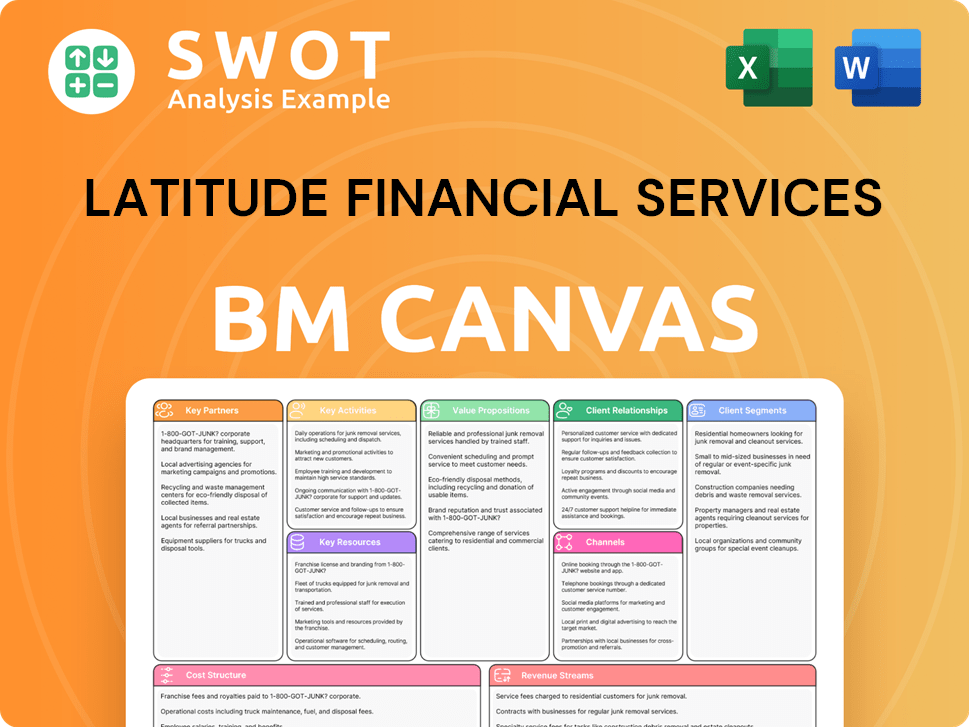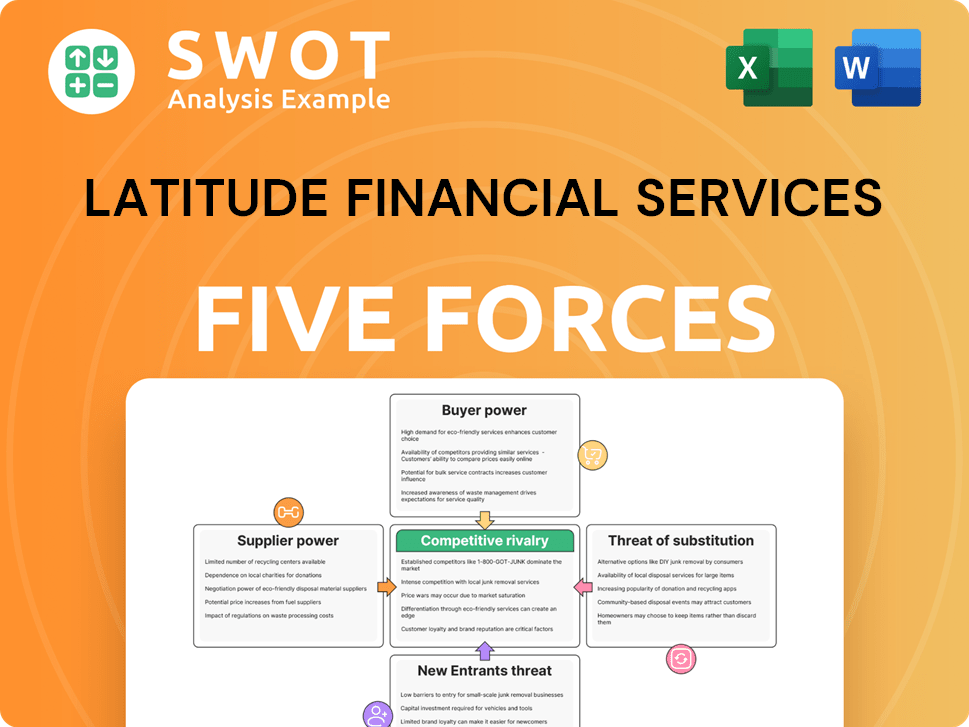Latitude Financial Services Bundle
Who Really Owns Latitude Financial Services?
Unraveling the Latitude Financial Services SWOT Analysis is just the beginning. Understanding Latitude Financial ownership is key to grasping its strategic moves and market influence. From its IPO on the ASX in April 2021 to its current status, the ownership structure of this major non-bank lender has seen significant shifts. This exploration delves into the evolution of who owns Latitude Financial.

Latitude Financial Services, a company with a rich history tracing back to the 1920s, operates as a significant player in the Australian and New Zealand financial landscape. Knowing the Latitude Financial company's ownership is vital for investors and stakeholders alike. Examining the Latitude Financial Australia operations, including its credit card and personal loan offerings, provides valuable insights. This analysis will reveal the Latitude Financial Services shareholders and their impact on the company's trajectory.
Who Founded Latitude Financial Services?
The story of Latitude Financial Services begins not with a traditional founder, but through acquisition. In November 2015, the company, as it is known today, emerged from the acquisition of GE Capital's consumer finance businesses in Australia and New Zealand.
This acquisition was led by a consortium including Deutsche Bank, KKR, and Värde Partners. The transaction was valued at A$8.2 billion, marking a significant private equity deal in the region at the time. This set the stage for Latitude Financial ownership in its current form.
While the precise initial ownership percentages among the consortium members aren't publicly available, these entities essentially became the 'founders' of Latitude Financial Services. They brought their expertise to build upon and develop the consumer finance products inherited from GE Capital. Early agreements would have outlined investment horizons and exit strategies.
The initial ownership structure of Latitude Financial company was shaped by a consortium of investors. Key players included Deutsche Bank, KKR, and Värde Partners, who acquired the business from GE Capital.
- The acquisition in 2015 was valued at A$8.2 billion.
- The consortium members functioned as the initial 'founders.'
- The focus was on leveraging and expanding the existing consumer finance offerings.
- Specific ownership percentages at inception are not publicly available.
Latitude Financial Services SWOT Analysis
- Complete SWOT Breakdown
- Fully Customizable
- Editable in Excel & Word
- Professional Formatting
- Investor-Ready Format

How Has Latitude Financial Services’s Ownership Changed Over Time?
The ownership of Latitude Financial Services has seen considerable shifts since its inception. Initially acquired from GE Capital in 2015 by a consortium including Deutsche Bank, KKR, and Värde Partners, the company remained private for several years. A pivotal moment was the Initial Public Offering (IPO) on the Australian Securities Exchange (ASX) on April 20, 2021. This IPO allowed existing owners, KKR, Värde Partners, and Deutsche Bank, to offer a portion of their shares to investors at $2.60 each. The IPO valued Latitude at $2.6 billion, with one billion shares issued.
Following the IPO, KKR, Värde Partners, and Deutsche Bank, through their holding company KVDS, retained a significant stake, approximately 66.4% of Latitude shares, subject to escrow. In August 2023, the major shareholders restructured their holdings, leading to KKR and Värde Partners each holding 26.25%, and Deutsche Bank holding 16.53% directly. This restructuring marked a shift in the direct control of shares among the key investors.
| Shareholder | Stake (as of January 17, 2025) | Notes |
|---|---|---|
| KKR & Co. Inc. | 26% | One of the top owners |
| Vatpo Investments Pte. Ltd. (Värde Partners) | 25% | Significant private company shareholder |
| Deutsche Asset & Wealth Management | 17% | Third-largest shareholder |
| Shinsei Bank Ltd. | 19.76% | Holds 205,476,320 shares as of June 2025 |
| Robert Belan (CEO) | Approximately 0.84% | Current CEO's holding |
As of January 17, 2025, the ownership structure shows that private companies, including KKR and Värde Partners, are the top owners, holding a combined 27% stake in Latitude Group Holdings. Deutsche Asset & Wealth Management holds a 17% stake. Shinsei Bank Ltd. holds 19.76% of the shares. The top 20 shareholders collectively hold 96.98% of shares on issue. These holdings indicate that major decisions are heavily influenced by these significant shareholders. The current CEO, Robert Belan, holds approximately 0.84% of the company's shares.
The ownership of Latitude Financial has evolved significantly since its acquisition and subsequent IPO.
- KKR and Värde Partners are major shareholders.
- Deutsche Bank and Shinsei Bank Ltd. also hold substantial stakes.
- The company's ownership structure is heavily influenced by institutional investors.
- The CEO holds a small percentage of the company's shares.
Latitude Financial Services PESTLE Analysis
- Covers All 6 PESTLE Categories
- No Research Needed – Save Hours of Work
- Built by Experts, Trusted by Consultants
- Instant Download, Ready to Use
- 100% Editable, Fully Customizable

Who Sits on Latitude Financial Services’s Board?
The current Board of Directors of Latitude Financial Services plays a vital role in the company's governance. The board includes representatives from major shareholders alongside independent directors. As of June 2025, the board comprises individuals with diverse backgrounds, ensuring a range of perspectives in decision-making. This structure helps in balancing the interests of various stakeholders, including shareholders and customers. The presence of independent directors is crucial for maintaining transparency and accountability within the company.
The board includes key figures such as Michael Tilley, serving as the Independent Non-Executive Chairman, and Bob Belan, the Managing Director and CEO, who joined the board in April 2023. Other members include Mark Joiner, Alison Ledger, and Julie Raffe, all serving as Independent Non-Executive Directors. Furthermore, Philip Busfield, Beaux Pontak representing Deutsche Bank, and Ilfryn Carstairs representing Värde Partners, contribute to the board's composition. The average tenure of the board members is approximately 3.5 years, indicating a wealth of experience.
| Director | Role | Representation |
|---|---|---|
| Michael Tilley | Independent Non-Executive Chairman | N/A |
| Bob Belan | Managing Director and CEO | N/A |
| Mark Joiner | Independent Non-Executive Director | N/A |
| Alison Ledger | Independent Non-Executive Director | N/A |
| Julie Raffe | Independent Non-Executive Director | N/A |
| Philip Busfield | Non-Executive Director | N/A |
| Beaux Pontak | Non-Executive Director | Deutsche Bank |
| Ilfryn Carstairs | Non-Executive Director | Värde Partners |
The voting structure at Latitude Financial Services generally follows a one-share-one-vote system, common among publicly listed companies on the ASX. However, the significant stakes held by major shareholders, such as KKR (with 26% ownership), Värde Partners (25%), and Deutsche Bank (17%) as of January 2025, provide them with considerable influence over major decisions. This ownership structure is a key factor in understanding Latitude Financial ownership and the dynamics of its decision-making processes. Despite the presence of independent directors, the representation of significant shareholders on the board ensures that their interests are directly considered in strategic discussions.
The board includes independent and shareholder-nominated directors, ensuring a balance of perspectives.
- Major shareholders like KKR, Värde Partners, and Deutsche Bank hold significant influence.
- The voting structure is primarily one-share-one-vote, but ownership concentration matters.
- Board members have an average tenure of 3.5 years, indicating experience.
- Understanding the board composition is crucial for assessing the company's strategic direction.
Latitude Financial Services Business Model Canvas
- Complete 9-Block Business Model Canvas
- Effortlessly Communicate Your Business Strategy
- Investor-Ready BMC Format
- 100% Editable and Customizable
- Clear and Structured Layout

What Recent Changes Have Shaped Latitude Financial Services’s Ownership Landscape?
Over the past few years, significant changes have occurred in the ownership and strategic direction of Latitude Financial Services. In August 2023, KKR, Värde Partners, and Deutsche Bank restructured their collective 69.25% stake, previously held through KVD Singapore Pte. This restructuring saw them take outright control of their respective interests, with KKR and Värde Partners each holding 26.25% and Deutsche Bank holding 16.53%. This shift has led to speculation about potential reductions in ownership by key shareholders, particularly Värde Partners.
Another notable trend is the increasing interest from Japanese investors. Tokyo-based SBI Shinsei Bank has been actively building its stake, reaching 19.76% (205,476,320 shares) as of July 2024. This reflects a broader trend of large financial institutions acquiring significant stakes in consumer finance companies. These developments are crucial for understanding the current Latitude Financial ownership structure and its future trajectory. To learn more about the company's approach, you can review the Marketing Strategy of Latitude Financial Services.
| Shareholder | Stake (as of July 2024) | Notes |
|---|---|---|
| KKR | 26.25% | One of the major shareholders. |
| Värde Partners | 26.25% | Another major shareholder. |
| Deutsche Bank | 16.53% | Significant institutional investor. |
| SBI Shinsei Bank | 19.76% | Increasing stake from Japanese investors. |
In terms of strategic moves impacting ownership, Latitude acquired Symple Loans in late 2021, demonstrating its intent to grow its market share. Additionally, the company ended its Buy Now, Pay Later (BNPL) service in Australia and New Zealand in February 2023. Public statements, like the FY24 results briefing in January 2025, highlight a focus on maintaining momentum in volume and receivables growth. As of June 13, 2025, Latitude's stock price was $0.73, with a market cap of $763 million and a trailing 12-month revenue of $701 million as of December 31, 2024.
Restructuring of major shareholder holdings in August 2023.
Acquisition of Symple Loans in 2021 and ending BNPL services in 2023.
Growing stake from Japanese investors, particularly SBI Shinsei Bank.
Stock price of $0.73 and a market cap of $763 million as of June 13, 2025.
Latitude Financial Services Porter's Five Forces Analysis
- Covers All 5 Competitive Forces in Detail
- Structured for Consultants, Students, and Founders
- 100% Editable in Microsoft Word & Excel
- Instant Digital Download – Use Immediately
- Compatible with Mac & PC – Fully Unlocked

Related Blogs
- What are Mission Vision & Core Values of Latitude Financial Services Company?
- What is Competitive Landscape of Latitude Financial Services Company?
- What is Growth Strategy and Future Prospects of Latitude Financial Services Company?
- How Does Latitude Financial Services Company Work?
- What is Sales and Marketing Strategy of Latitude Financial Services Company?
- What is Brief History of Latitude Financial Services Company?
- What is Customer Demographics and Target Market of Latitude Financial Services Company?
Disclaimer
All information, articles, and product details provided on this website are for general informational and educational purposes only. We do not claim any ownership over, nor do we intend to infringe upon, any trademarks, copyrights, logos, brand names, or other intellectual property mentioned or depicted on this site. Such intellectual property remains the property of its respective owners, and any references here are made solely for identification or informational purposes, without implying any affiliation, endorsement, or partnership.
We make no representations or warranties, express or implied, regarding the accuracy, completeness, or suitability of any content or products presented. Nothing on this website should be construed as legal, tax, investment, financial, medical, or other professional advice. In addition, no part of this site—including articles or product references—constitutes a solicitation, recommendation, endorsement, advertisement, or offer to buy or sell any securities, franchises, or other financial instruments, particularly in jurisdictions where such activity would be unlawful.
All content is of a general nature and may not address the specific circumstances of any individual or entity. It is not a substitute for professional advice or services. Any actions you take based on the information provided here are strictly at your own risk. You accept full responsibility for any decisions or outcomes arising from your use of this website and agree to release us from any liability in connection with your use of, or reliance upon, the content or products found herein.